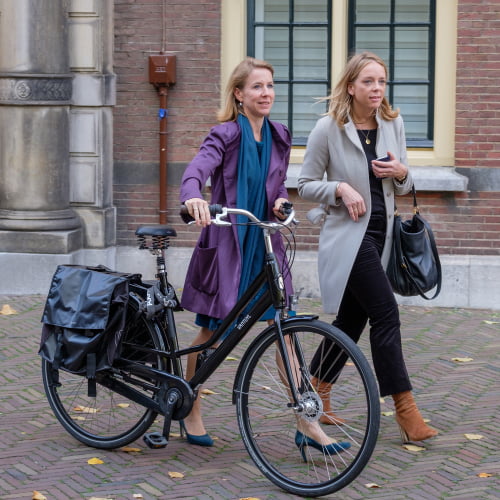The quality of the taxi market and taxi policy are regulated nationally and the requirements set therefore apply to all taxi operators and drivers. The same applies to requirements that can be imposed locally with regard to public order, nuisance and traffic. Due to the specific characteristics of the entry-level market, municipalities may impose additional local rules on that part of the market, for example about the recognisability of taxi vehicles, the local street knowledge of taxi drivers and about submitting and handling complaints.
State Secretary S. van Veldhoven - Van der Meer:
"As announced in my previous letter, I recently spoke with municipalities under independent chairmanship and guided by the Municipal Network for Mobility and Infrastructure (GNMI) about the problems in the taxi market that municipalities experience locally and how to deal with them.".
This taxi policy has led to better insight and a shared picture of the local problems and the desired follow-up. The problems experienced by municipalities are largely related to public order or road safety. In addition, municipalities experience problems with supervision and enforceability, also in view of the fact that a substantial number of taxi drivers are active on both the boarding and the order market.
This analysis has shown that municipalities can benefit from the fact that the taxi market can be regulated in its entirety (i.e. various types of problems and for both the boarding and the order market) on the basis of existing laws and regulations. To this end, the State Secretary identifies with the municipalities which municipal powers and best practices can be used to address specific problems in the taxi market and taxi policy, depending on the specific local situation and through local policy and the taxi regulation. This can be legal provisions, but also traffic-influencing measures.
Not only do municipalities not only have to reinvent the wheel for taxi policy, but it also offers better insight into the instruments available to them. In addition, it contributes to the harmonization of municipal taxi policy, without the need to regulate local problems nationwide.
Also sees the Secretary of State together with municipalities, an added value in strengthening enforcement on the taxi market by, on the one hand, better cooperation between local and national enforcement authorities and, on the other hand, better exchange of information that is relevant for enforcement between these authorities. This fits within the pillar “Cooperation services” of the Taxi program, which is being prepared by the ILT and the further measures that the ILT is taking to strengthen enforcement.
State Secretary van Veldhoven - Van der Meer will also continue to talk to municipalities in other ways to tackle local problems, in particular taxi policy in the municipality of Amsterdam. In this context, IenW was also represented in the Taskforce between Amsterdam and Uber, which presented a social charter on 8 July 2019. According to her, good agreements were made about safety, the income and driving times of drivers, enforcement and sanctioning and the sharing of information.
Insurance
During the general consultation Insurance for taxi drivers on April 17, 2019, the enforcement of uninsured taxi vehicles was discussed. From 1 October 2019, all taxis will be 100% checked by the RDW by means of a so-called register comparison. License plate holders can be fined through this desk check if they are uninsured or not MOT. Until now, these obligations have only been checked via a standing posture. It is expected that this adapted form of enforcement will have a preventive effect.
On the basis of his responsibility for the operation of the taxi insurance market, the Minister of Finance informed the House on 2 July 2019. The Minister and the Secretary of State will continue to discuss the issue with the sector and the Dutch Association of Insurers.
Enforcement
In her letter of 14 March 2019, she indicated that within the taxi policy, more work was done on enforcement on the On-Board Computer Taxi (BCT) by means of desk enforcement and the development of the new BCT Supervision Tool. Structural improvement of desk enforcement will increase the chance of being caught.
Because desk enforcement makes it possible to deploy capacity more efficiently, there is more room on the street for risk-based enforcement. In addition, the results of broad desk enforcement provide clues for targeted street checks. Because they remain urgently needed to track down parties who try to evade the rules. Desk enforcement must be in order for this.
To improve desk enforcement, the first half of two pilots has therefore continued to develop the new analysis tool, the BCT Supervision Tool. The aim of both pilots is primarily to strengthen the information position of the ILT (one of the pillars of the Taxi program) and to develop a supervisory method for this.
The first results with the new analysis tool are good. It has emerged that there are still many uncertainties in the use of the BCT among small companies. Companies that have not sent (good) BCT files have received feedback. In this way, companies are encouraged to prevent violations. Failure to deliver BCT files or to deliver them incorrectly may result in additional checks for these companies. The ILT has now started a subsequent pilot of 100 companies.
The roll-out of BCT supervision tool among inspectors will take place later in the autumn.
In the past period, the ILT has conducted a joint enforcement action 17 times with the police and enforcers of the municipality of Amsterdam. These have concentrated in Amsterdam because of the higher risk profile. As indicated, enforcement capacity will be further expanded to further intensify the number of targeted street checks.
BCT developments
Until recently, faults in the BCT could only be remedied in an approved workshop. As a result of a change in the regulations, malfunctions of the BCT can also be remedied on location from 1 January 2020 by so-called mobile activation units (MAE). The MAE must then have the designation “recognized workshop”. This change increases the options available to taxi operators in the event of a malfunction. This means that a separate appointment for a repair is not necessary and a trip to a workshop is saved.
Investigate accidents
As reported in March, the Foundation for Scientific Research on Road Safety (SWOV) was commissioned to further map the developments in the number of accidents involving taxis. On the basis of the BRON data from the police, SWOV looked at the development of the number of (serious) injury accidents that occurred with taxi vehicles between 2001 and 2018. The study made a distinction, among other things, between the location of the accidents and the age of the drivers.
The survey shows that about 2% of accidents involving cars and vans involving injuries involve a taxi. The study also shows an increase in taxi accidents and casualties in the period from 2015 to 2018. The figures show that there is an increase in the share of taxi cases in total in Amsterdam and to a lesser extent in Utrecht. accidents with cars and vans. The study makes no statements about the causes of this.
Analysis of the available police data does not indicate that younger taxi drivers are overrepresented in accidents. The largest share of taxi drivers involved in accidents is between 50 and 60 years old. As indicated, these results are based on data on personal injury accidents, because these accidents in particular are registered by the police.
This data does not provide information about accidents with material damage only, nor has it proved possible to distinguish between providers or between the boarding and ordering market. The study did not include the development of the number of taxis. The increase in the number of accidents involving taxis in a number of cities is a cause for concern.
“I will therefore enter into discussions with Amsterdam and Utrecht to find out what the explanation or the causes of the increasing share of accidents with taxis may be compared to the national picture. I will include the recommendations that SWOV makes on exposure and endangering and have it investigated further ”, said the State Secretary.
Information about exposure includes developments in the number of driver cards and taxis in a city in relation to regular traffic: the higher the number of taxis, the greater the chance that a taxi will be involved in an incident. Further research into endangering provides more information about driving conditions, such as the physical environment.
Sustainable taxi transport
As previously indicated during the General Consultation on Sustainable Transport on 5 September, the State Secretary conducted an initial exploration of the options for accelerating the transition to zero-emission taxi transport. At the end of the year, it expects to have a detailed overview of the bottlenecks within taxi policy and the opportunities for this and aims to have made agreements with all parties involved on the basis of this around the summer of next year.
Also read: Pins, small amount allowed? HTS Taxi requires € 2 extra



